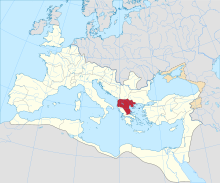
Back Macedonia (Romeinse provinsie) Afrikaans Macedonia (Provinz) ALS Macedonya (provincia romana) AN مقدونيا (مستعمرة رومانية) Arabic Македония (провинция) Bulgarian Makedonija (rimska provincija) BS Macedònia (província romana) Catalan Makedonie (provincie) Czech Macedonia (romersk provins) Danish Macedonia (Provinz) German
| Macedonia Μακεδονία | |||||||||||
|---|---|---|---|---|---|---|---|---|---|---|---|
| Province of the Roman Empire | |||||||||||
| 146 BC–7th century | |||||||||||
 The province of Macedonia within the Roman Empire, circa 125 | |||||||||||
| Capital | Thessalonica in Late Antiquity: Thessalonica (Prima) Stobi (Salutaris)[1] | ||||||||||
| Historical era | Antiquity | ||||||||||
• Established | 146 BC | ||||||||||
• Some territory overrun by the Slavic invasion of the Balkans, other territory is transformed into the Theme of Thessalonica later on | 7th century | ||||||||||
| |||||||||||
| Today part of | Greece North Macedonia Albania Bulgaria | ||||||||||
Macedonia (Greek: Μακεδονία)[2][3] was a province of ancient Rome, encompassing the territory of the former Antigonid Kingdom of Macedonia, which had been conquered by the Roman Republic in 168 BC at the conclusion of the Third Macedonian War. The province was created in 146 BC, after the Roman general Quintus Caecilius Metellus defeated Andriscus of Macedon, the last self-styled King of Macedonia in the Fourth Macedonian War. The province incorporated the former Kingdom of Macedonia with the addition of Epirus, Thessaly, and parts of Illyria, Paeonia and Thrace.[4]
During the Republican period, the province was of great military significance, as the main bulwark protecting the Aegean region from attacks from the north. The Via Egnatia, which crossed the province from west to east was of great strategic importance, providing the main overland link between Rome and its domains in the Eastern Mediterranean. In this period, campaigns against the Dardani and Scordisci to the north and the Thracians to the east were nearly constant. By the first century BC, the province notionally extended to the Danube.
Macedonia was a central theatre for several campaigns of the civil wars at the end of the Republic, including the Battles of Pharsalus and Philippi. During the Second Triumvirate, it fell within Marc Antony's sphere. Several important Roman military colonies were established in Macedonia in this period. After the province came under the control of Augustus following the Battle of Actium in 30 BC, the northern sections were split off as the provinces of Moesia, Dalmatia and Pannonia, meaning that the province lost much of its military role in defending the Danube border, but it remained important for supply purposes and as a source of military manpower. Until AD 15 and again after AD 44, Macedonia was a senatorial province, governed by a proconsul.
Throughout the Imperial period, Macedonia was a prosperous region with several thriving cities, notably Thessalonica and Philippi. These communities were organised in a similar way to other cities of the Roman Empire and were largely self-governing. Greek was the main language of the region, but Latin was used for official purposes and in the Roman colonies. There were substantial Christian communities in the province by the mid-first century AD.
In late antiquity, the province was split into several smaller units, but the old provincial capital, Thessalonica, became the regional centre for the Balkan region and was briefly an Imperial capital under Licinius. The provincial system gradually faded away, until it was replaced altogether by the theme system in the mid-seventh century AD, but the region continued to form part of the Eastern Roman Empire until the end of the fourteenth century.
- ^ A Companion to Ancient Macedonia, By Joseph Roisman and Ian Worthington, page 549
- ^ [1] Archived 2017-04-24 at the Wayback Machine D. C. Samsaris, Historical Geography of the Roman province of Macedonia (The Department of Western Macedonia today) (in Greek), Thessaloniki 1989 (Society for Macedonian Studies).ISBN 960-7265-01-7.
- ^ [2] Archived 2017-04-24 at the Wayback Machine D. C. Samsaris, Historical Geography of Eastern Macedonia during the Antiquity (in Greek), Thessaloniki 1976 (Society for Macedonian Studies).ISBN 960-7265-16-5.
- ^ Melville-Jones, John (2021). "The Borders of Ancient Makedonia III: Roman Makedonia". Macedonian Studies Journal. 2 (1). ISSN 2204-3128.
© MMXXIII Rich X Search. We shall prevail. All rights reserved. Rich X Search